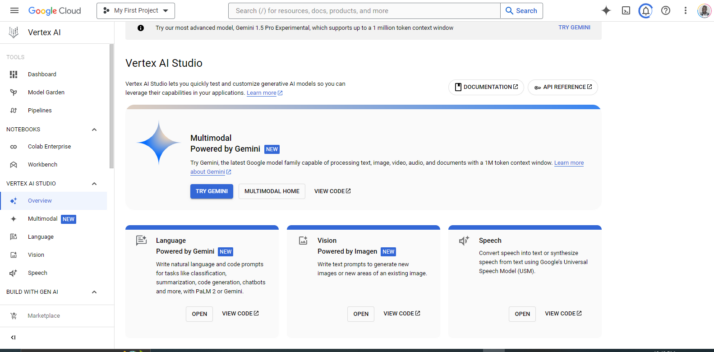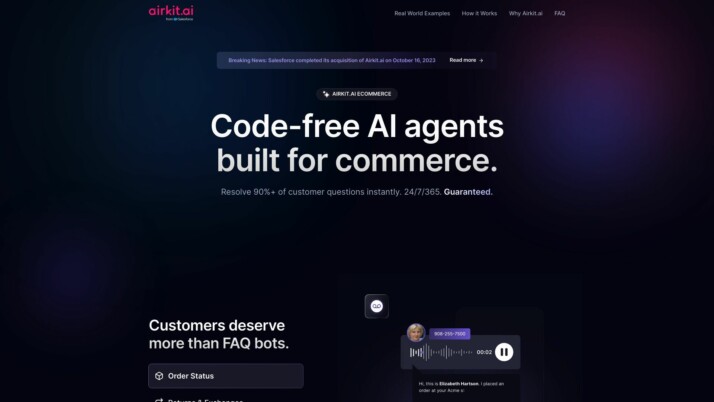Vertex AI vs. Airkit AI: Comparing Advanced ML and No-Code E-commerce AI
AI-powered customer service and machine learning platforms are reshaping how businesses interact with customers and leverage data. Vertex AI vs. Airkit AI represent two distinct approaches to this technological frontier. Vertex AI offers a comprehensive suite of tools for developing and deploying sophisticated AI models, while Airkit AI specializes in no-code AI agents for e-commerce support. This comparison delves into the strengths, limitations, and unique features of each platform, alongside SmythOS, our versatile AI solution. Whether you’re a developer seeking advanced AI capabilities, a business leader looking to streamline customer service, or an entrepreneur exploring AI integration, this analysis provides crucial insights to inform your decision-making process.
Vertex AI Overview
Vertex AI empowers developers to create, deploy, and manage advanced machine learning models and AI applications. This comprehensive platform integrates data engineering, data science, and ML engineering workflows, streamlining the entire AI development process.


Screenshot from Vertex AI studio.
Vertex AI’s standout feature is its support for multimodal generative AI models, particularly Gemini. These models process diverse input types, including text, images, audio, and video, enabling the creation of sophisticated AI-powered applications. The platform offers advanced capabilities such as reasoning, multiturn chat, and code generation, catering to a wide range of AI use cases.
Vertex AI’s standout feature is its support for multimodal generative AI models … enabling the creation of sophisticated AI-powered applications.
The Generative AI Workflow in Vertex AI includes the Model Garden, a library for discovering, testing, and deploying various AI models. Users can customize Google’s foundation models to improve cost-efficiency and response latency. Features like grounding, retrieval-augmented generation (RAG), and function calling enhance model responses with real-time information and external API integration.
Vertex AI provides robust tools for AI model management, including a centralized Model Registry and a Feature Store for efficient ML feature serving. The platform integrates MLOps capabilities, allowing users to monitor model performance and orchestrate workflows effectively. Specialized models like Imagen for text-to-image generation and MedLM for healthcare applications further expand Vertex AI’s versatility.
While Vertex AI offers powerful capabilities, it requires coding knowledge for model development and deployment, potentially limiting accessibility for non-technical users. The platform’s enterprise-focused approach may also present challenges for smaller organizations or individual developers in terms of cost and complexity. Despite these considerations, Vertex AI remains a formidable choice for businesses and developers seeking a comprehensive, scalable AI development platform.
Airkit AI Overview
Airkit AI offers a powerful platform for creating AI-driven customer service solutions. This cloud-based system enables businesses to rapidly deploy intelligent agents capable of handling common e-commerce queries without coding. By automating repetitive support tasks, Airkit AI aims to enhance customer experiences and reduce agent workload.


Screenshot of Airkit Website
Airkit AI offers a powerful platform for creating AI-driven customer service solutions … enables businesses to rapidly deploy intelligent agents capable of handling common e-commerce queries without coding.
Airkit AI specializes in no-code AI agent development for the e-commerce sector. The platform provides pre-built conversational skills tailored to online retail, allowing companies to launch AI-powered support in hours rather than weeks or months. These AI agents integrate seamlessly with existing help desk and CRM systems, providing a unified approach to customer engagement.
Key features of Airkit AI include instant resolution for over 90% of routine customer requests, continuous learning to improve performance over time, and auto-scaling capabilities to handle demand spikes. The platform’s focus on ease of use makes it accessible to non-technical teams, while its cloud architecture ensures reliability and scalability.
Key features of Airkit AI include instant resolution for over 90% of routine customer requests, continuous learning to improve performance over time, and auto-scaling capabilities to handle demand spikes.
Airkit AI’s recent acquisition by Salesforce in October 2023 positions it to enhance customer service capabilities within the Salesforce ecosystem. This move promises to bring Airkit’s e-commerce-focused AI agents to a broader audience, potentially revolutionizing how businesses interact with customers across digital channels.
While Airkit AI offers impressive automation capabilities, its specialization in e-commerce may limit its applicability for businesses in other sectors. Additionally, users seeking more extensive customization options or advanced AI research tools may find the platform’s no-code approach restrictive. However, for e-commerce businesses looking to rapidly deploy effective AI-powered customer support, Airkit AI presents a compelling solution.
Feature Comparison
Vertex AI and Airkit AI offer distinct approaches to AI development and deployment. Vertex AI provides a comprehensive machine learning platform with advanced capabilities for developing and deploying sophisticated AI models. It supports multimodal inputs, including text, images, audio, and video, enabling diverse AI applications. Vertex AI’s Model Garden allows customization of foundation models, improving cost-efficiency and response latency.
In contrast, Airkit AI specializes in no-code AI agent development for e-commerce customer service. It offers pre-built conversational skills tailored to online retail, allowing rapid deployment of AI-powered support. Airkit AI focuses on ease of use and accessibility for non-technical teams, while Vertex AI requires coding knowledge for model development.
Both platforms have gaps in their core components. Vertex AI lacks a no-code editor, potentially limiting accessibility for non-technical users. Airkit AI’s specialization in e-commerce may restrict its applicability in other sectors. In terms of security, Vertex AI provides robust features like data encryption and IP control, while Airkit AI’s security capabilities are less clearly defined in the available information.
Feature Comparison Table
| Vertex AI | Airkit AI | SmythOS | |
|---|---|---|---|
| CORE FEATURES | |||
| Visual Builder | ✅ | ❌ | ✅ |
| No-Code Options | ❌ | ✅ | ✅ |
| Explainability & Transparency | ✅ | ❌ | ✅ |
| Debug Tools | ✅ | ❌ | ✅ |
| Multimodal | ✅ | ❌ | ✅ |
| Multi-Agent Collaboration | ✅ | ❌ | ✅ |
| Audit Logs for Analytics | ❌ | ❌ | ✅ |
| Work as Team | ✅ | ❌ | ✅ |
| Agent Work Scheduler | ✅ | ❌ | ✅ |
| SECURITY | |||
| IP Control | ✅ | ❌ | ✅ |
| COMPONENTS | |||
| Foundation AIs | ✅ | ❌ | ✅ |
| Huggingface AIs | ❌ | ❌ | ✅ |
| Zapier APIs | ❌ | ❌ | ✅ |
| Classifiers | ✅ | ❌ | ✅ |
| Logic | ✅ | ❌ | ✅ |
| Data Lakes | ✅ | ❌ | ✅ |
| DEPLOYMENT OPTIONS (EMBODIMENTS) | |||
| Deploy as API | ✅ | ❌ | ✅ |
| Deploy as Webhook | ✅ | ❌ | ✅ |
| Staging Domains | ✅ | ❌ | ✅ |
| API Authentication (OAuth + Key) | ✅ | ❌ | ✅ |
| Deploy as Scheduled Agent | ✅ | ❌ | ✅ |
| Deploy as GPT | ✅ | ❌ | ✅ |
| DATA LAKE SUPPORT | |||
| Hosted Vector Database | ✅ | ❌ | ✅ |
| Sitemap Crawler | ❌ | ❌ | ✅ |
| YouTube Transcript Crawler | ❌ | ❌ | ✅ |
| URL Crawler | ✅ | ❌ | ✅ |
| PDF Support | ✅ | ❌ | ✅ |
| Word File Support | ✅ | ❌ | ✅ |
| TXT File Support | ✅ | ❌ | ✅ |
Best Alternative to Vertex AI and Airkit AI
SmythOS emerges as the superior alternative to Vertex AI and Airkit AI, offering a comprehensive AI agent development platform that combines power with accessibility. Our platform addresses the limitations of both competitors, providing a unified solution for businesses seeking to harness AI’s potential.
We excel in ease of use, featuring an intuitive drag-and-drop interface that enables rapid AI agent creation without extensive coding knowledge. This visual builder empowers both technical and non-technical users to design sophisticated AI workflows effortlessly. Unlike Vertex AI’s complex development environment or Airkit AI’s narrow e-commerce focus, SmythOS supports a vast array of use cases across industries.
SmythOS emerges as the superior alternative to Vertex AI and Airkit AI, offering a comprehensive AI agent development platform that combines power with accessibility.
Our feature set outshines the competition. We offer multi-agent collaboration, enabling teams of AI agents to work together on complex tasks — a capability lacking in Airkit AI. Our platform supports multimodal inputs, including text, images, and audio, matching Vertex AI’s capabilities while surpassing Airkit AI’s limited text-based interactions. SmythOS also provides robust debugging tools and explainability features, ensuring transparency in AI operations that neither competitor fully addresses.
Unlimited use cases set SmythOS apart. While Vertex AI caters to sophisticated ML model development and Airkit AI focuses on e-commerce customer service, we enable the creation of AI agents for any scenario. From chatbots and virtual assistants to data analysis tools and automated workflow systems, SmythOS adapts to diverse business needs. Our extensive API integrations, including support for Zapier, further expand the potential applications of AI agents built on our platform.
By choosing SmythOS, businesses gain a powerful, flexible, and user-friendly AI development environment that overcomes the limitations of Vertex AI and Airkit AI. We empower organizations to innovate faster, automate more effectively, and unlock the full potential of AI across their operations.
Conclusion
Vertex AI and Airkit AI offer powerful AI solutions, each with unique strengths. Vertex AI excels in providing a comprehensive platform for advanced machine learning and AI development, supporting multimodal inputs and offering sophisticated model customization options. Airkit AI, on the other hand, shines in its specialized focus on e-commerce customer service, offering rapid deployment of AI agents without coding.
While both platforms have their merits, SmythOS emerges as the superior choice for businesses seeking a versatile, user-friendly AI solution. Our platform combines the best of both worlds – advanced AI capabilities and ease of use – making it accessible to both technical and non-technical users alike.
SmythOS stands out with its intuitive drag-and-drop interface, extensive integration ecosystem, and versatile deployment options. We offer unparalleled flexibility, allowing you to create AI agents that can be deployed across various platforms, from APIs to chatbots. Our multi-agent orchestration feature enables complex task handling, while our pre-built templates and API integrations significantly reduce development time.
Experience the future of AI development with SmythOS. Explore our diverse range of AI-powered agent templates to jumpstart your projects, or dive into our comprehensive documentation to unlock the full potential of our platform. Ready to revolutionize your workflow? Create a free SmythOS account and start building AI agents today – no time limit, no risk, and unlimited possibilities.
Last updated:
Disclaimer: The information presented in this article is for general informational purposes only and is provided as is. While we strive to keep the content up-to-date and accurate, we make no representations or warranties of any kind, express or implied, about the completeness, accuracy, reliability, suitability, or availability of the information contained in this article.
Any reliance you place on such information is strictly at your own risk. We reserve the right to make additions, deletions, or modifications to the contents of this article at any time without prior notice.
In no event will we be liable for any loss or damage including without limitation, indirect or consequential loss or damage, or any loss or damage whatsoever arising from loss of data, profits, or any other loss not specified herein arising out of, or in connection with, the use of this article.
Despite our best efforts, this article may contain oversights, errors, or omissions. If you notice any inaccuracies or have concerns about the content, please report them through our content feedback form. Your input helps us maintain the quality and reliability of our information.
